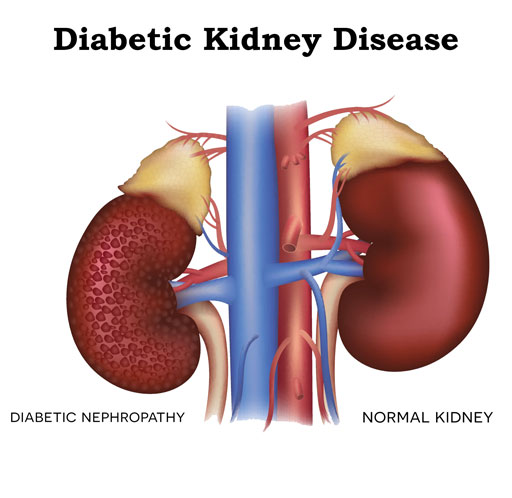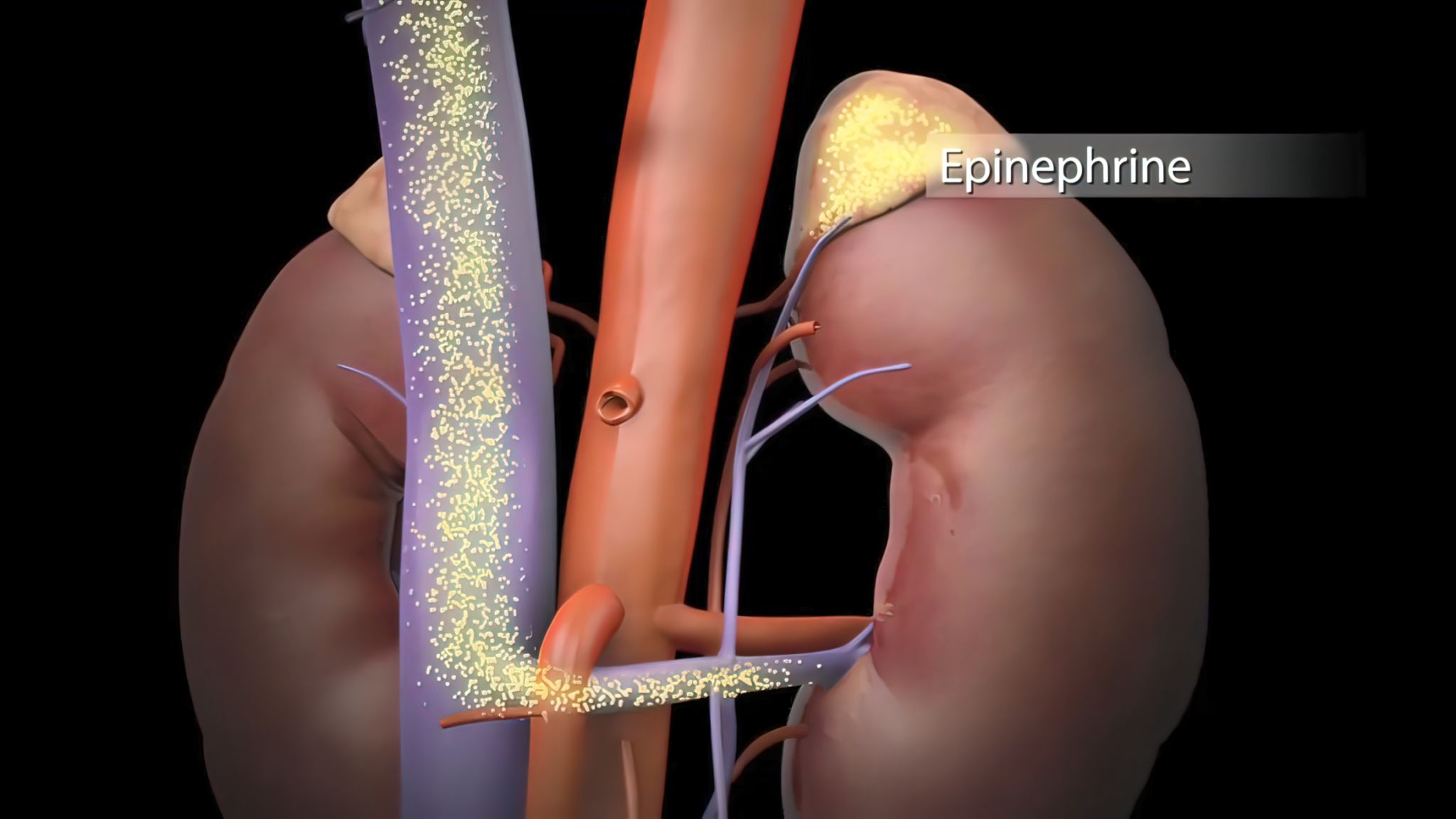Diabetic Kidney Disease (Diabetic Nephropathy)
Diabetic nephropathy or diabetic kidney disease occurs when high blood glucose levels due to diabetes damage blood vessels and other cells in your kidneys.
Diabetic Kidney Disease Signs and symptoms
In the early stages many people won’t have any signs and symptoms. However, in the later stages signs and symptoms manifest and may include loss of appetite; shortness of breath; difficulty concentrating; confusion, reduced need for diabetes medicine or insulin, high urge to urination; swelling of eyes, hands, ankles or feet; protein in urine; worsening high blood pressure; fatigue, persistent itching; nausea and vomiting.
How does diabetes cause kidney disease?
Millions of tiny blood vessels are present in the form of clusters called glomeruli that filter blood and remove waste materials from the kidneys. Uncontrolled diabetes can damage these blood vessels and leads to diabetic kidney disease or nephropathy – decreased kidney function and kidney failure. Diabetes kidney disease can lead to high blood pressure (Diabetic Chronic Kidney Disease Hypertension) – which further damages the kidneys by putting and increasing pressure in the nephrons of kidneys.

Does kidney disease affect diabetes?
Diabetes kidney failure: kidney disease is a silently progressive condition. In other words, it is a silent killer – both men and women are equally prone to kidney disease. Uncontrolled high blood pressure and diabetes can progressively lead to kidney failure or end-stage kidney disease (a life-threatening condition). At this stage – the only option that is left will be either dialysis or renal transplantation. Diabetes kidney failure treatment – the only option is renal transplantation.
Diabetic drugs that cause kidney failure
People with diabetes must follow all the instructions on packages of both prescription and nonprescription (over-the-counter) pain relievers such as ibuprofen, naproxen, aspirin and NSAIDs. Taking both these drugs can lead to kidney damage if a person has diabetic nephropathy or diabetic neuropathy.
Diabetic kidney disease stages
Stages of diabetic kidney disease: people who are living with diabetes are at risk of developing diabetic kidney disease (nephropathy). It is a progressive condition that gradually and progressively gets worse through five stages.
You don’t experience any symptoms during the early stages of kidney disease. Therefore, regular health checkups are important. In healthy persons, the urine doesn’t contain protein (albumin). Depending on the stages of kidney disease varying amounts of albumin is present in the urine. Another parameter to assess kidneys function is glomerular filtration rate (GFR) – The rate at which kidneys filter blood. Healthy and normal kidneys have a GFR of 100% or they function at 100%. A GFR of 60% or above will not diagnose kidney disease – between 15 – 60% is kidney disease and less than 15% is considered as kidney failure.
Diabetic kidney disease progresses through the following stages:
Stage 1: During this stage, your kidneys’ function gets little bit disturbed. It becomes little bit harder for your kidneys to function normally. Urine analysis may report traces of protein in the urine sample. (GFR is 90% and above)
Stage 2: Though kidneys function normally, some signs of kidney damage manifests slowly with elevated levels of protein in the urine. (GFR is 60 – 89%)
Stage 3: Kidneys function progressively gets disturbed. Many people don’t have any symptoms. Still, some people may report swelling in hands or feet, anemia and high blood pressure. (GFR is around 30 – 59%)
Stage 4: This is a serious condition. A close monitoring of kidney’s function is crucial to prevent kidney failure. Kidney’s do not function properly – as a result – symptoms such as swelling in hands and feet changes in urination pattern may manifest. The other manifestations include buildup of phosphorus, acidity and high potassium levels in the blood with high levels of protein in urine. (GFR is between 15 – 29%)
Stage 5: This is a very severe condition where in kidneys stop functioning and may result in kidney failure. The symptoms include changes in urination patterns, back pain, nausea and vomiting, muscle cramps, itching, swelling in hands or feet, loss of appetite, trouble sleeping or breathing, seizures, confusion and metallic taste in the mouth. (GFR is under 15%)

Diabetic kidney disease diagnosis treatment and prevention
Diabetic routine testing and the tests that are recommended as a part of effective management of diabetes help diagnose diabetic nephropathy. The screening for diabetic nephropathy in individuals with type 1 diabetes begins after five years after the diagnosis of diabetes. In type 2 diabetes cases, the screening begins at the time of diagnosis.
Routine screening tests for the detection of diabetic nephropathy
Urine albumin test: Normally kidneys do not filter albumin out of the blood. The presence of protein albumin or excess amounts of albumin in urine indicate poor kidney function. Urine albumin test helps detect blood protein albumin in the urine.
Glomerular filtration rate (GFR): Creatinine levels in the blood sample tells or give an estimation of kidneys filtration rate (glomerular filtration rate). This rate helps in estimation of kidneys filtration efficiency. A low filtration rate suggests less efficient kidney function.
Albumin/Creatinine Ratio: Healthy kidneys filter out creatinine from the blood. It is a chemical waste product. The ratio of albumin to creatinine gives another clue of kidney function.
Diabetic Kidney disease treatment
People who have uncontrolled diabetes are at risk of diabetic kidney disease. They should first control diabetes and high blood pressure. The other treatment options include prescription medicines, exercise, lifestyle changes and diet. Prescription medicines include blood sugar control medicines, blood pressure control medicines, cholesterol lowering drugs and inflammation and tissue scarring control drugs in diabetic nephropathy.
If diabetic kidney disease (diabetic nephropathy) progresses to end-stage kidney disease (kidney failure) one should discuss the treatment options with their nephrologists. The treatment options include replacing the function of the kidneys (dialysis) or replacing the damaged kidneys (Kidney transplantation).
How to reverse kidney damage from diabetes?
Kidney’s filter and remove waste products and excess fluid from the body. This is their natural ability. But diabetic kidney disease or nephropathy causes damage to the kidneys – owing to which they do not do their work properly. The best way to prevent or reverse or delay diabetic kidney disease is by adopting a healthy lifestyle and properly managing high blood pressure and diabetes.
How long does it take for diabetes to cause kidney disease?
Diabetic kidney disease is a progressive condition that causes slow damage to kidney’s delicate filtering system (nephrons). It may take several years for diabetes to cause kidney disease.
What are the risk factors for diabetes kidney disease?
The factors that increase the risk of diabetic kidney disease, if a person is living with diabetes, include obesity, high blood cholesterol, smoking, hypertension (high blood pressure); hyperglycaemia (uncontrolled high blood sugar); high blood cholesterol and a family history of diabetes and kidney disease. The other risk factors include a ethnicity, race, sex, age and the initiation factors include Acute Kidney Injury and high blood glucose levels (hyperglycemia)
DKD risk factors can conceptually be classified as susceptibility factors (e.g., age, sex, race/ethnicity, and family history), initiation factors (e.g., hyperglycemia and AKI), and progression factors (e.g., hypertension, dietary factors, and obesity) (Table 1) (13). Two of the most prominent established risk factors are hyperglycemia and hypertension.
Remember a first line of prevention of diabetic nephropathy: one should manage blood sugar levels and hypertension, to prevent or delay kidney dysfunction and other complications.